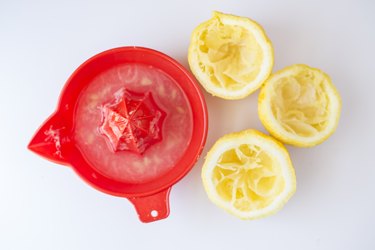
Lemon juice is an easy, low-calorie way to flavor water or put zing in a fresh salad. However, lemon juice for belly fat burning is a myth, so don't expect it to single-handedly work wonders on your waistline. The only thing that burns abdominal fat is a reduced-calorie diet and regular exercise.
Tip
Lemon juice doesn't burn belly fat, although it can play a role in helping you reduce your calorie intake.
Video of the Day
Low-Calorie Lemon Water
The juice from one-half lemon contains just 5 calories, according to the USDA. That means it's basically a guilt-free way to make water more appealing, make a zesty salad dressing, marinate a chicken breast or wake up a filet of fish. Compare that to tasty yet fat and calorie-laden dressings and store-bought marinades and flavored waters.
Video of the Day
But besides being flavorful and nearly calorie-free, lemon juice doesn't have any special effects on fat burning. Some health and nutrition faddists claim that drinking a glass of lemon water first thing in the morning can jumpstart your metabolism for increased fat burning, but there is no scientific evidence to support this.
Lemon juice is also often used to detoxify the body, which is frequently claimed to promote fat loss. This is a myth, too. According to the National Center for Complementary and Integrative Health, there is no quality research or compelling evidence that detox regimens have any effect on weight. More likely, fat loss on a cleansing diet comes from a reduced calorie intake, and not from any single ingredient.
Lemon Juice for Belly Fat
The only proven method to burn abdominal fat is to reduce your calorie intake below your daily calorie needs. This encourages your body to stop storing fat and start burning stored fat for energy. There are two ways to create a calorie deficit — by reducing your calorie intake and by burning more calories through exercise.
Low-calorie diets can be hard to stick to. If they aren't properly planned, they can leave you feeling unsatisfied and hungry, which can lead to cravings and unintended indulgences. Finding ways to make your meals more satiating while reducing the amount you eat is key to success.
Increasing your fiber and protein intake while lowering your fat and sugar intake is one way to increase satiety. Both help fill you up and keep you feeling full for longer, so you can curb cravings and stay on the weight-loss wagon. In fact, just making that one change to your diet can get you results, even if you don't actively restrict calories, according to findings from a small study published in Nutrition in October 2018.
Read more: The Best Cardio Exercise to Lose Belly Fat
Pile your plate with lots of fresh veggies and sensible portions of lean protein, such as chicken, turkey, fish or tofu at each meal. Then, use low-calorie herbs and spices, as well as acidic accoutrements like vinegar and lemon juice, to add an extra punch. Skip cheese, fatty sauces and excess amounts of cooking oil to keep the calories low.
You can also use lemon water for weight loss results by drinking a big glass before you sit down to eat. Subjects of a small study published in Clinical Nutrition Research in October 2018 drank a glass of water either before or after a meal. Drinking water before a meal led participants to consume fewer calories at the meal compared to drinking water after a meal or drinking no water at all.
The mechanisms of action aren't fully understood, but a logical explanation is that the water fills up your stomach, causing you to feel full before you even start eating. Adding lemon juice to your water won't have any added effect, but it may make chugging a glass before each meal more appealing.
- USDA FoodData Central: "Lemon Juice, Raw"
- National Center for Complementary and Integrative Health: "'Detoxes' and 'Cleanses': What You Need To Know"
- Nutrition: "A Nonrestrictive, Weight Loss Diet Focused on Fiber and Lean Protein Increase"
- Clinical Nutrition Research: "Effect of Pre-meal Water Consumption on Energy Intake and Satiety in Non-obese Young Adults"